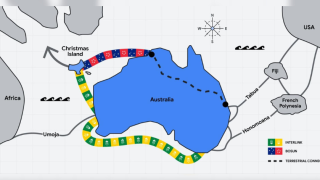Orange and China Telecom have signed a strategic partnership framework agreement to cooperate in four main areas; IPVPN, managed services, network resources and Wifi roaming. The agreement will initially focus on improving access and services for Orange’s business customers in China and likewise China Telecom’s in Europe.
European data centre service provider Interxion is planning to build its seventh data centre in Frankfurt. The facility will be designed to help meet growing customer demand in the German city, which the company claims is becoming an increasingly attractive option for connectivity-intensive companies, particularly in the digital media, financial services, and cloud service markets. The 1,550m2 facility is due to be available for customer installations in Q1 2012.
Data centre operator Equinix has added three new names to its list of Carrier Ethernet exchange partners, significantly boosting its European credentials. The addition of Colt Technology Services, GTS Central Europe and Norway-based Broadnet to the Equinix Carrier Ethernet Exchange (ECEE) platform takes its total of carrier and cloud service provider partners around the world to 55. For more information click here.
The Costa Rican operator ICE Celular is reportedly considering deploying an LTE network in the nation by the end of 2012. The move would put the operator two years ahead of its original schedule, which it has re-evaluated following recent developments in 4G technology.
The Africa Coast to Europe (ACE) subsea cable has landed at the Penmarc’h cable station in Brittany in France, the last major economy to be connected before the system goes live in 2012. The 17,000 km cable now extends from France down to South Africa, taking in most countries on Africa’s east coast on the way. It will provide the first ever direct international connectivity to several economies, including Gambia, Guinea, Equatorial Guinea, Liberia, Mauritania, Sao Tome and Principe and Sierra Leone. Terrestrial extensions to the cable will also bring landlocked countries such as Mali and Niger online. For more information click here.
TeliaSonera has announced that it will invest in more frequencies in the 1800MHz band across the Swedish market. The move comes as a result of a recent licence auction, with the company looking to use the frequencies as part of its ongoing plans to create Sweden’s largest 4G network. Part of the 1800MHz band is already being used in TeliaSonera’s 2G network.
The Brazilian mobile operator Vivo, a subsidiary of Spanish telecoms giant Telefonica, has announced that it will invest more than $70 million in expanding its services to reach all cities in Brazil’s Amazonas state by 2012. The operator will look to interconnect the state’s radio frequencies with Brazil’s national network and develop satellite services into some of its more remote areas.
The government of Israel has launched a competitive tender to find a partner to build a national fibre network in partnership with utility company Israel Electric Corp. It said the resulting network will need to provide fast internet access and broadcast services, in competition with the country’s two existing fixed-line network operators. The winner of the competitive process, to be announced within six months, will get a 51% controlling stake in a new communications infrastructure company. The network will be expected to deliver super-fast Internet access to two thirds of Israeli homes within seven years, and eventually cut the cost of services to ‘tens of shekels’ a month. For more information click here.
Sidera Networks has completed an expansion to its collocation facility in Philadelphia, US. The company acquired additional space to accommodate up to 100 new racks in order to meet growing customer demand. The move brings the company’s collocation footprint to nearly 40,000ft2 in Philadelphia alone.
Ukrainian operator Eurotranstelecom (ETT) has upgraded its eastern European backbone network to 100G, which it claimed is the first commercial deployment at that performance level in the region. ETT’s network extends nationwide across Ukraine, running alongside the country’s rail system and connecting onwards to other networks in Russia, Poland, Hungary and Slovakia. For more information click here.




